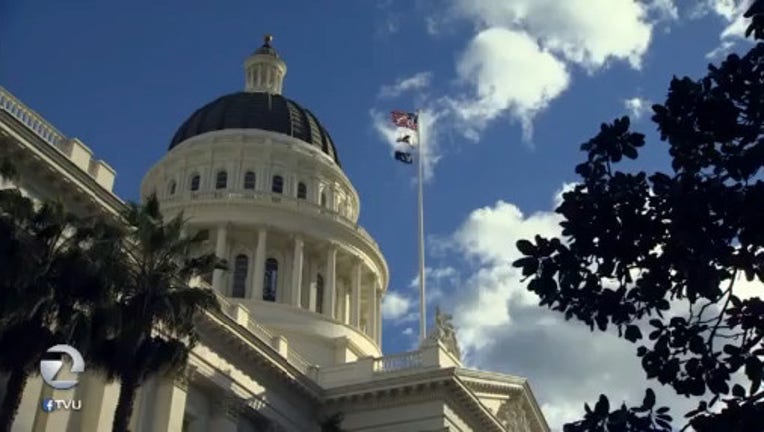These new laws take effect in California on July 1

SACRAMENTO, Calif. - A series of new laws will go into effect in California on July 1. They range from legislation related to consumer issues to a law seeking to crack down on retail theft, as well as minimum wage hikes in many Bay Area cities.
Here’s a look at some of the new laws:

FILE - Girls drinking alcohol and dancing. (Photo by PYMCA/Avalon/Getty Images)
Drink spiking prevention
Assembly Bill 2375 would require bars, nightclubs and cocktail lounges to provide customers with a lid to cover their drinks, upon request. The law applies to holders of California's Type 48 license — businesses that exclusively sell alcohol but aren't required to serve food.
It seeks to offer protections to prevent customers' drinks from getting spiked.
"The bill would authorize the licensee to charge an additional fee for providing a lid with a customer’s drink and would prohibit the fee from exceeding the reasonable cost of providing the lid," the law states.
Under AB 2375, businesses with Type 48 licenses are also required to update posted signs that notify patrons of the availability of drug testing kits, to include reference to lids now being available.
The signs must be posted in a prominent and conspicuous location and now must read:
"Don’t get roofied! Drink lids and drink spiking drug test kits available here. Ask a staff member for details."
Under AB 1013, which went into effect last year, establishments that sell alcohol to be consumed on-site were required to provide drug testing kits that can detect the presence of so-called "roofies."
Consumer
Assembly bill 2863 is designed to help consumers cancel subscriptions. The new law requires businesses to receive a consumer’s "affirmative consent" to renew or continue a paid subscription.
Under existing law, a subscription or purchasing agreement continues until the consumer explicitly cancels the service.
The new law will require businesses to get permission from the customer to extend a subscription when the free trial or contract ends.
The legislation applies to subscriptions that start, are amended or extended on or after July 1, 2025.
Crack down on sale of stolen goods
Introduced by former East Bay State Senator, now California Energy Commissioner Nancy Skinner, Senate Bill 1144 seeks to help crack down on the sale of stolen goods on online marketplaces.
The legislation requires online sellers like eBay and Facebook Marketplace to start collecting information on high-volume third-party sellers.
Starting July 1, virtual markets must implement a stated policy prohibiting the sale of stolen goods on their site. They must also provide a process for consumers to notify the marketplace of the sale of stolen goods.
The law goes even further by requiring an online marketplace to alert law enforcement agencies when it knows that a third-party seller is selling or attempting to sell stolen goods to a California resident.
SEE ALSO: Rare look into SFPD hi-tech unit cracking down on crimes
Short-term rental cleaning fees
AB 2202, targets hidden cleaning fees often imposed by short-term rentals. The new law will require short-term lodging sites, like Airbnb, to disclose any additional fees, charges, or other penalties that will be added to the costs if a renter fails to complete certain cleaning tasks.
Renters must also be provided a description of those tasks before reserving their stay.
Short-term lodging sites that fail to comply could be fined up to $10,000 per violation.
Students’ mental health
SB 1063 requires California schools, both private and public, serving students grades 7-12, to print the number for the 988 Suicide and Crisis Lifeline.
The legislation also pushes for schools to include a quick response, or QR, code that links to local mental health resources and websites.
Protections for household domestic workers
SB 1350 extends occupational safety and health protections to many household domestic service workers.
Under the existing law, the definition of "employment," as related to California’s Occupational Safety and Health Act, excludes domestic service workers in private homes.
Starting July 1, permanent and temporary workers employed by agencies offering services like house-cleaning or nanny care will receive workplace protections under Cal-OSHA’s health and safety laws.
Minimum wage
Many California cities will implement planned increases to their minimum wage come July 1.
Those cities and their new minimum per hour wage include:
- Alameda: $17.46
- Berkeley: $19.18
- Emeryville: $19.90
- Fremont: $17.75
- Milpitas: $18.20
- San Francisco: $19.18
CARE Act Courts
SB 42 builds on the CARE Act, which seeks to ensure an adult with untreated, severe mental health disorders receives court-ordered mental health services by allowing a petitioner, often a caretaker, parent or other family member, to ask a court to create a voluntary CARE agreement or a court-ordered CARE plan.
Starting July 1, California courts will be required to provide petitioners ongoing notice and updates of CARE Act proceedings.
Delay in IVF law
A bill to expand accessibility to fertility treatments, SB 729, was supposed to go into effect on July 1, but its implementation has now been delayed six months to Jan. 1, 2026.
The law requires large-group health plans to provide coverage for infertility diagnosis and fertility treatments, including IVF.
The bill does not apply to those who get their health coverage through Medi-Cal or through religious employers.
State Senator Caroline Menjivar (D-San Fernando Valley) authored the bill, calling it "a victory for reproductive justice in California," when it was signed into law by Governor Gavin Newsom last year.
On June 27, state lawmakers approved a plan to delay the timeline as part of a health omnibus trailer bill. That bill, AB 116, was signed by the governor the following Monday.
Advocates of SB 729 expressed deep disappointment over the delay.
"As someone who would have to rely on access to fertility treatments for my own family-building, I understand the disappointment with a delay of coverage," said Menjivar in a statement released on July 1. "I know how frustrating another 6 months is, both emotionally and financially, for folks who are counting the days until they can welcome a child."
The state senator said that the bill marks a first for California and celebrated what it represented.
"Our state has never mandated infertility health care coverage, so I hope Californians can be patient with us a little longer as we get this right for its implementation now in January 2026. And remember, SB 729 is just one battle in our quest to expand fertility and infertility treatment coverage to even more aspiring parents!"
Under SB 729, for CalPERS, which includes many state government workers, there is a separate date of July 1, 2027, for the law to go into effect.

PRODUCTION - 17 January 2024, Berlin: In the cell laboratory, culture dishes are prepared at the Fertility Center Berlin to collect the eggs after egg retrieval. Photo: Jens Kalaene/dpa (Photo by Jens Kalaene/picture alliance via Getty Images)

Appeals court temporarily blocks judge's ruling to return control of National Guard to California
A federal judge on Thursday ruled in favor of California Gov. Gavin Newsom, granting a temporary restraining order that directs President Donald Trump to return control of the National Guard to the governor. However, within hours, the 9th U.S. Circuit Court of Appeals temporarily blocked that federal judge's order.

